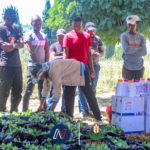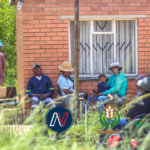…A Bold National Response to Lesotho’s Youth Unemployment Crisis
By Staff Reporter
Lesotho is battling a youth unemployment crisis of unprecedented proportions, with over 760,000 young Basotho aged 15 to 35 currently unemployed, while only around 145,000 are employed, according to the Bureau of Statistics (BoS).
The youth unemployment rate remains alarmingly high, sitting at approximately 24.2% for ages 15–24, with some estimates placing it as high as 39%. In response to this dire situation, Prime Minister Samuel Matekane recently declared youth unemployment a national disaster, underscoring the urgency of bold and immediate intervention.
Amid this crisis, agriculture has emerged as a cornerstone of the government’s job creation strategy, with 28,870 new job opportunities earmarked for young people across the country.
Irrigation Revival to Create Over 22,000 Jobs
A key component of this plan is the revival of large-scale irrigation infrastructure, initially proposed under the now-aborted Millennium Challenge Corporation (MCC) project.
“We cannot continue to rely on rainfall alone. Irrigation is the key to sustainable food production, especially in the face of climate change,” said Minister of Agriculture, Food Security and Nutrition, Thabo Mofosi.
According to the Minister, the government is committed to supporting this initiative, although the final financing model is still under development.
Through this programme, 1,580 hectares of land in Mohale’s Hoek and Leribe will be developed, resulting in:
- 3,160 permanent jobs
- 18,960 casual labour opportunities during peak seasons
This totals 22,120 jobs, the single largest contributor to the government’s projected employment targets.
6,000 Youth Jobs Through SADP II
An additional 6,000 jobs will be created through the Smallholder Agricultural Development Programme II (SADP II). Beginning this August, the initiative will place 1,000 youth—100 from each district—into mentorships with experienced farmers for the October to December planting season.
Each mentored youth is expected to hire five peers, multiplying the total job impact to 6,000.
“The programme will focus on poultry production, wheat and crop farming, as well as vegetable processing and value addition,” Mofosi said.
Climate Resilience Pilot to Hire 60 Youth
The Ministry is also piloting a climate-resilient agriculture programme, which will engage 60 youth—10 per district—with each receiving:
- Free farming inputs
- 80% production insurance against climate-related losses
“This is about empowering young people to farm with confidence. They will know that even if disaster strikes, they are protected,” Mofosi explained.
Mechanisation: 200 Jobs Through Tractor Scheme
In an effort to reduce dependence on manual labour and modernize farming, the Ministry has partnered with Post Bank Lesotho to distribute 200 tractors, creating 200 new jobs for trained operators.
Already, 30 young women in Butha-Buthe have been trained in tractor operation. “I’ve been instructed to ensure that youth are a significant portion of the beneficiaries of this mechanisation programme,” Mofosi stated.
Wool and Mohair Value Chain to Employ 450 Youth
Through the Wool and Mohair Value Chain Competitiveness Project (WaMCoP), an estimated 450 youth will be trained and employed in wool processing, Livestock feed production and fertilizer manufacturing
“By the end of the project, we aim to have youth-led operations producing fibre-quality-tested wool, as well as locally made feed and fertilizer, reducing our dependence on imports,” said the Minister.
Land Leasing to Create 160 Jobs
Minister Mofosi also revealed that 160 jobs will come from leasing underutilised arable land owned by institutions such as the Lesotho Agricultural College to youth-led agribusinesses.
“The Ministry is finalising inclusive lease agreements that ensure youth can access productive land without bureaucratic hurdles,” he said.
Horticulture: A Call for Youth Participation
Although only one youth is currently involved in the LNDC-coordinated horticulture project, Trade Minister Mokhethi Shelile said the government aims to expand the initiative to nine orchards nationwide.
“So far, we have six men, three women, and only one youth involved. We need more young farmers in horticulture,” Shelile urged.
Business Incubation and Incentives
Entrepreneurship hubs such as Sebabatso and the Pathways to Sustainable Livelihoods Initiative have already supported over 3,500 individuals, nearly half of them youth. These hubs provide, business incubation, financial literacy training and access to start-up capital.
To further support young agripreneurs, the government has rolled out key incentives:
- 30% discount on tractors and farm machinery
- Tax relief for youth-led businesses
- Public procurement opportunities for youth, women, and people with disabilities (PWDs)
- Removal of registration fees for youth-owned enterprises
Prime Minister Matekane stressed the need for sufficient funding: “If resources and finances do not exist, it is useless,” he warned.
Voices from the Ground: Young Farmers Speak Out
Alice Letata, a 12-hectare farmer, noted: “Even where land is available, access to machinery remains a challenge. We miss out on production cycles because we can’t afford the equipment.”
Lebohang Mosaola, a wool and mohair grower and graduate of Lesotho Agricultural College, said, “I welcome the 30% machinery discount, but is there research proving the wool processing initiative is viable? And when will it be implemented?”
Why Agriculture?
Agriculture currently accounts for 29.2% of total employment, yet contributes only 6.6% to GDP (as of 2023). However, it indirectly supports 80% of the population, making it a high-impact sector for poverty reduction and sustainable development.
To further modernize the sector, the government—with support from the World Bank—has developed the Lesotho Climate-Smart Agriculture Investment Plan (CSAIP). The plan targets CSA adoption on 30% of agricultural land by 2030, focusing on:
- Climate-resilient crop varieties
- Drip irrigation and efficient water use
- Soil conservation
- Agroforestry
These practices are expected to improve food security, income, and nutrition, while also creating jobs in both on-farm and off-farm activities such as training, machinery maintenance, and agro-processing.
A Stark Reminder: The Numbers Behind the Crisis
According to the 2025 United Nations Voluntary National Review, Lesotho’s unemployment challenges remain acute:
- Youth unemployment rose from 29.1% in 2019 to 37.75% in 2024
- Overall unemployment stood at 30.29%, with female unemployment at 30.80%
- A staggering 84% of youth are in informal employment, lacking benefits and job security.








